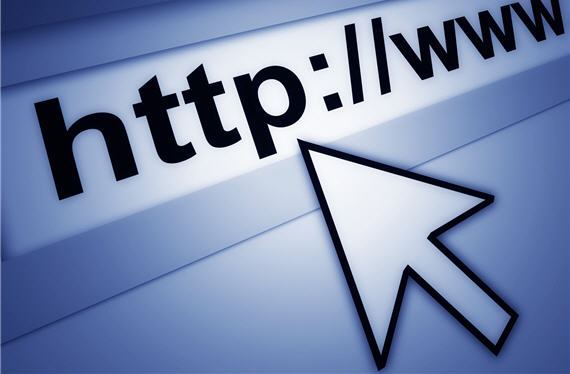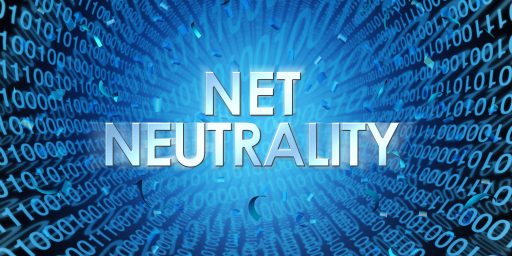FCC Adopts Net Neutrality Rules, Neither Side Happy
The Federal Communications Commission is using a statute from the 1930s to try to regulate the technology of the 21st Century. It's a mistake.
In its first foray into regulating the backbone of the Internet, the Federal Communications Commission decided on a party-line vote to adopt standards requiring Internet Service Providers to allow open access to their networks:
The Federal Communications Commission voted Tuesday to approve its first ever Internet access regulation, which ensures unimpeded access to any legal Web content for home Internet users.
The same provisions do not apply as strongly to cellphone users because the agency voted to keep wireless networks generally free of rules preventing the blocking and slowing of Web traffic.
The FCC’s three Democratic members made up a majority of votes in favor of the so-called net neutrality regulation, which was introduced more than a year ago by FCC Chairman Julius Genachowski.
The rules have sparked intense debate and lobbying over whether such legislation is needed, and are likely to face a legal challenge. Genachowski has argued that Internet access rules would protect companies just starting out on the Web, as well as consumers who are increasingly relying on the Internet for news, entertainment and communications.
The agency’s two Republican members voted against the rules, showing support for Internet service providers who say the regulation will impede their ability to create new business plans that expand their roles over the Internet economy.
Genachowski said the measure represents a compromise between industry and consumer interests.
“I reject both extremes in favor of a strong and sensible framework — one that protects Internet freedom and openness and promotes robust innovation and investment,” Genachowski said.
Like most compromises, neither side in the debate was left happy by the Commission’s decision. On the left, where Net Neutrality has become something close to gospel, Genachowski’s plan is being denounced as a sellout to the corporate interests:
For the first time in history of telecommunications law the FCC has given its stamp of approval to online discrimination.
Instead of a rule to protect Internet users’ freedom to choose, the Commission has opened the door for broadband payola – letting phone and cable companies charge steep tolls to favor the content and services of a select group of corporate partners, relegating everyone else to the cyber-equivalent of a winding dirt road.
Instead of protecting openness on wireless Internet devices like the iPhone and Droid, the Commission has exempted the mobile Internet from Net Neutrality protections. This move enshrines Verizon and AT&T as gatekeepers to the expanding world of mobile Internet access, allowing them to favor their own applications while blocking, degrading or de-prioritizing others.
Instead of re-establishing the FCC’s authority to act as a consumer watchdog over the Internet, it places the agency’s authority on a shaky and indefensible legal footing — giving ultimate control over the Internet to a small handful of carriers.
What this criticism ignores, of course, is the fact that service providers do have legitimate points when they note, for example, that high-volume users of digital video and peer-to-peer fie sharing network use the network at the expense of lower bandwidth users, and that there are legitimate economic and security reasons for allowing them to have the ability to charge differently for different types of services, at least as long as we live in an era where bandwidth is a limited resource.
While the left, complains, Republicans in Congress are already warning the FCC that even this watered down plan faces scrutiny when the 112th Congress convenes in January. Ed Morrissey, for example, passes along this message from Senate Minority Leader Mitch McConnell:
I’m Senator Mitch McConnell, the Republican Leader in the U.S. Senate.
The Internet is a platform for innovation. Every day entrepreneurs, including many in Kentucky, offer new services to millions of Americans, like yourself, who use the internet on a daily basis – and are using it right now to watch this video. Our economy has benefited from the rapid growth of the Internet, and that’s due in large part to the lack of government involvement.
But that could soon change. The Obama Administration, which has already nationalized health care, the auto industry, insurance companies, banks and student loans, now wants to brazenly control how Americans use the Internet by establishing federal regulations on its usage. This would harm investment, stifle innovation and lead to job losses.
I, along with several of my colleagues, have urged the FCC Chairman to abandon this flawed approach. But we need your help. Please share this video with your friends on the Internet.
The Internet is a valuable resource and it must be left alone.
Additionally, it looks like the new regulations are likely to face an immediate court challenge:
Multiple sources have told National Journal that Verizon, the nation’s second largest telecommunications carrier, may seek to overturn the historic open Internet rules to be approved by the Federal Communications Commission Tuesday morning. Sources said the option is on the table, but cautioned that no final decision has been made. The company will review the details of the new “network neutrality” rules set for adoption by the agency’s three Democratic regulators to gauge its next move.
The FCC has already been rebuffed by one court in its efforts to extend its regulatory authority over the Internet, and it’s likely to see that happen again. Especially since, as Morrissey notes, the analogies which the Commission is seeking to apply here simply don’t hold water:
Genachowski’s approach equates the Internet to telephone service and the 1934 Communications Act that birthed the FCC and granted it jurisdiction. However, that was a state-approved private monopoly that required regulation in the absence of competition, which the government outlawed prior to breaking up AT&T. The Internet has plenty of competition, especially for end users, who can either get service over the hard wire of their local telephone service, a cable-TV network, or wireless access. In that competitive environment, the FCC has no business dictating the management of private networks.
While it was built on top of the framework of a network developed by government scientists, the Internet, and the network that supports it, has flourished primarily because of the free market. There is neither a need nor a justification for involving the heavy hand of the state in something that is working so well.







It’s not just different types of services. This decision allows the ISPs to play favorites, giving preferential bandwidth and access to the companies that are willing to pay through the nose for it, at the expense of the rest of us who want to actually be able to use the bandwidth we paid for in the way that we want to.
Then add on the fact that in many areas, the broadband ISPs like Comcast are an effective local monopoly, or in an oligopoly with another provider. And when someone tries to mount a challenge to that, they respond with lawsuits.
Brett, you’re ignoring the fact that certain types of traffic (such as VoIP and video conferencing) NEED to be given priority on network backbones, because they are extremely sensitive to latency and jitter, whereas data downloads and web browsing are not sensitive at all. Complete neutrality would mean that companies wouldn’t be able to offer QoS anymore, which would be crippling to our business customers.
There is neither a need nor a justification for involving the heavy hand of the state in something that is working so well.
What the standards do is maintain what we already have. It doesn’t require ISPs to do anything differently at all. Is that really the heavy hand of the state?
Also, notice that McConnell addresses nothing specific. His position is government is bad, just because. Weak sauce. At least HuffPo addresses the issue at hand (even if I disagree with them about wireless networks, which cannot possibly handle the volume of traffic they will be dealing with without some prioritization schemes for different content types), unlike the incoming Speaker, who can’t be bothered to discuss what exactly is objectionable about this.
It’s not just different types of services. This decision allows the ISPs to play favorites, giving preferential bandwidth and access to the companies that are willing to pay through the nose for it, at the expense of the rest of us who want to actually be able to use the bandwidth we paid for in the way that we want to.
Ben covered much of this, pointing out your apparent lack of understanding of the technology you are discussing, but I’d like to ask what you mean by “allow(ing) the ISPs to play favorites.” Do you mean types of data (voice and video vs. best effort data like text and images) or data sources/content? There’s a big difference.
Uh, shouldn’t internet service providers be treated as common carriers, such as the Postal Service and (I think), airlines, UPS & FedEx? Isn’t that all the FCC’s proposed plan does (at least for non-wireless)?
In other words, IIRC FedEx can’t refuse to carry a package or charge a discriminatory fee based on who the sender is, isn’t that what the FCC is doing?
> The Obama Administration, which has already nationalized health care, the auto industry, insurance companies, banks and student loans,
I am thinking that this bald faced lie more or less discredits anything McConnell has to say.
Net Neutrality is a tricky subject. On one hand, we don’t want to risk the government mucking up something that is working pretty well. On the other, major players do not care for the level playing field that the internet offers, and would like to return to what they regard as the rightful state of affairs, which is to say a world in which they enjoy significant competitive advantages across all channels.
Certainly after some of the horrific experiences I have had with Comcast the idea of them enjoying even greater influence over my internet life does not thrill me.
I think the ruling is about right. The situation of the big broadband wired ISPs is distinctive. They’re all built on monopolies either local, e.g. Comcast or national, e.g. ATT (remember Ma Bell?). These companies didn’t create the Internet, at least some of them fought it when they had the chance, and they’re profiting mightily from it. They should be expected to bear some cost beyond the cost of their own equipment.
Doug, here’s the problem as I see it with allowing Comcast in particular to block access to content for its customers. Comcast is both a cable TV company and an ISP. If, in its role as ISP, it elects to block access to, say, Netflix streaming to its customers in order to protect its cable TV business, its customers may well have no recourse.
The picture is made a little more complicated by Comcast’s announced purchase of a majority share in NBC. By doing that it will acquire a substantial share in Hulu. Does it make more sense for Comcast to block access to Hulu or its customers to preserve its cable business or to expand its relationship with Hulu to give its customers more service? I’m guessing the former but damned if I know.
I’m not generally a free market drone but we really need to allow more competition in the broadband market. A large portion of the united states is served by only one real broadband provider with a few dial up like competitors if any at all. Where I live right now whole blocks are Charter only or Time warner only which is just ridiculous because I thoroughly enjoy my current local cable provider. Much like how you’re able to choose your electrical provider you should be able to freely choose your internet provider. THe problem is comcast and the other shitty providers will fight anything like that tooth and nail because they know if given the choice a lot of their customers will jump ship asap.
My fiancee and I have dealt with comcast in more then one state and their service is always terrible. Usually you have to wait a week or so for them to show up to fix a problem that is their fault and their speeds usually not very good and on top of that they are blocking certain services already…
The solution is to take the for profit companies out of the equation and nationalize our telecommunications infrastructure. Internet access has become critical enough that it should be considered a utility and not a convenience and consequently managed by government bodies not incompetent corporations (and yes our cable and telephone companies are amazingly incompetent).
Allowing the ISPs to prioritize certain kinds of traffic is simply a distraction from the real issue- that they have created a hodgepodge rickety system that is often on the verge of completely falling apart due to mismanagement and a desire to cut corners. That’s why our internet stats are so much worse than virtually every other first world nation even though we had a huge head start. We’ve let it all be managed by for profit enterprises- the single worst way to manage pretty much anything.
Well, if I don’t like the way TimeWarner implements this I can change providers …
… can’t I?
“Brett, you’re ignoring the fact that certain types of traffic (such as VoIP and video conferencing) NEED to be given priority on network …”
Tell me Brett, would that be true if bandwidth commitments (what TimeWarner told me I purchased) were not mythical?
There IS a net-neutral solution to this. That is that the customer buys bandwidth, receives it, and uses it.
As I understand it, you have a QoS worry because TimeWarner (and other last-mile providers) over-committed and can’t really deliver.
(Doug, I think your “What this criticism ignores, of course, is the fact that service providers do have legitimate points when they note …” falls for the same over-commitment lie. If I was really getting X mbps downstream, then I’d have that when I wanted it. And the pipes would handle it.)
I’m not generally a free market drone but we really need to allow more competition in the broadband market.
Who isn’t allowing competition? This market naturally produces monopolies.
Mantis well according to my local provider they are unable to service several sections of the city due to charter or time warner having exclusive access negotiated with the city.. So I’d say it’s the cities themselves..
“Who isn’t allowing competition? This market naturally produces monopolies.”
Your local government owns their cable vaults and/or poles. They have a municipal monopoly to physical access. It has been custom for them to grant monopoly access to a single television cable provider in return for that provider’s commitment to broad access.
That was harmless when it was “just tv”
It’s a unfortunate turn of history though when the tv providers received the windfall of becoming, de facto, the municipality’s monopoly internet provider.
Internet is different. And had we started with the understanding of what this really was and what it really meant, I think many cities would have put dueling providers in place, to ensure local competition.
I joke above about changing providers. I can do that right? All I have to do is sell my house.
In my old hometown the big providers weren’t interested in running the fiber to get cable internet going and weren’t interested in updating the phone wires to get dsl going either so I was stuck with dial up or 2.4ghz wireless internet. I ran the wireless (had to pay a couple hundred in equipment costs) but it ended up having serious issues to the point that they dropped me because there were too many packets being dropped from my antenna to theirs. Fortunately they had a competitor by this point so I paid another couple hundred to get 900mhz wireless with the blazing download speed of 80 KB/s (assuming it wasn’t raining storming or their network wasn’t being a pos) at the cost of like 60 bucks a month. Even though the service was terrible (I went a whole month with no access due to their tower being goofed) I had no other choice but to stay with this ISP. The best part about this isp was when I was told by a tech and others that file sharing was illegal and then I had the awkward moment of having to explain to these people how the internet works (hello web pages share files etc ugh). When I canceled my service with them they never bothered to actually close my account so months after moving 1200 miles away I got a phone call demanding I pay them money. EVen though they had records of me canceling my service they claimed a representative was unable to get ahold of me cause my phone was disconnected and as such they were unable to disconnect me so I owed them for months of non usage… Needless to say I tried to negotiate with them and in the end they declared I owed them at least one month of payment for non service for which I told them to pucker off.. Interestingly not long after I moved away Verizon kicked into high gear and replaced the COs and such so they could start offering DSL. Sadly Verizon had to sell of their DLS service there because of a court ruling involving their monopoly blah blah…
Long story short I hate hate hate government mandated isp monopolies…
Ben and Mantis, net neutrality doesn’t stop QoS (which is already being used), in fact nobody is arguing against QoS. The argument is that while ISPs can rate limit based on the kind of data, they shouldn’t be allowed to rate limit based on the source of data. Worse still, ISPs want to be able to charge non-customers for use of their networks.
For example, my ISP may want to charge Google to let their traffic come to me, even though I already pay my ISP for the bandwidth I use, and Google is not one of their customers. Or maybe my ISP wants to charge me more to watch Netflix content than they charge for me watching Hulu content, even though my actual usage of the bandwidth I’m paying for would be the same.
Internet is different. And had we started with the understanding of what this really was and what it really meant, I think many cities would have put dueling providers in place, to ensure local competition.
I joke above about changing providers. I can do that right? All I have to do is sell my house.
I agree, which is why I support Net Neutrality for hardwire ISP’s… but it’s also why I think that the exception for cell phone providers may be appropriate. There may be only four national carriers and a few more regional ones, but that’s exponentially better than two (and satellite, if you’re desperate).
On the other hand, I hate cell phone companies. With a passion.
So… I’m torn.
Down is long in goose, duck’s stomach, down into the reed-like flowers, into a sheet called feathers. Because down is an animal protein fiber than cotton (plant cellulose) insulation is high, and down on the clouds of millions of spherical fiber small triangle hole, to contraction and expansion with temperature changes, resulting in thermostat function, can be absorbed Moncler Doudoune noire En peau de moutondistribute the flow of body heat, cut off from the outside cold air invasion
Related:
Apple, Google, NewsCorp and the Future of Content
That’s what I was hoping to get at. If I pay for a certain amount of bandwidth, I should be able to use that however I want.
I don’t want to end up in an Internet where Netflix loads super-slow (or not at all) because my ISP cut a deal with some of the cable subscription companies to give their streaming services preferential access, particularly not when my ISP in the only one providing broadband in my area.